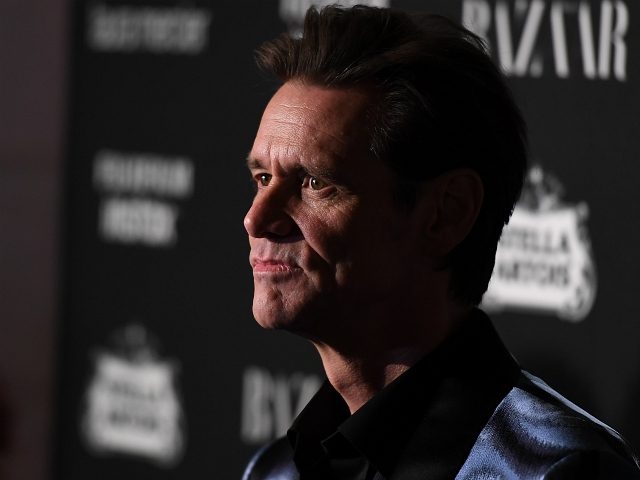Venezuelans suffering through the worst crisis in the nation’s history have responded with outrage to actor Jim Carrey’s call to the world to “say yes to socialism.” In a column published Wednesday, columnist Laureano Márquez argued that Carrey misunderstands the “repression” conducted in the name of socialism in places like the Latin American country.
Márquez, writing for the Venezuelan outlet Runrunes, gives Carrey the benefit of the doubt as an actor with no known education in political science. “Sometimes it seems that Hollywood stars’ inability to understand politics is directly proportional to their on-screen talent,” he writes. “Reagan was always a very untalented actor, thank God.”
Márquez argues that Carrey is using a definition of socialism that is naive and out of touch with the realities experienced in places like Venezuela, suggesting he believes socialism “is a word that sounds pretty … the antithesis of selfishness, synonym of concern for others, equal distribution of riches, support for the weakest and their needs, health and education for everyone, etc.”
He goes on to note that dictators like Venezuela’s Nicolás Maduro use the word “socialism” to “hide deep threats … against what is considered socialism, hiding a purely intolerant and hardcore authoritiarianism, if not an outright dictatorship.” He cites the fact that Maduro’s family and cronies control the limited wealth left in the country, leaving most of the rest of the citizenry eating out of the garbage.
“In Venezuela, we have grown to hate the word socialism, it represents oppression against the people, the destruction of a flourishing nation, and the desperation of its citizens,” Márquez concludes.
Venezuela has few remaining media outlets that still publish anti-socialist viewpoints, Runrunes being one and El Nacional, one of the nation’s oldest newspaper, remaining as the only major publication in the country still printing within its borders against the regime. Many other Venezuelan opposition sites operate in the diaspora, and Venezuelan citizens outside of the country take advantage of their freedom to express themselves on social media. One of these outlets, the anti-socialist Maduradas, published a compilation of reactions to Carrey’s remarks from Venezuelans on Twitter, including some who had fun superimposing Carrey’s face on an image of Argentine mass murderer Ernesto “Che” Guevara.
Lamentablemente debemos imnformar que se le fundió el coco a Jim Carrey.
Seguramente el delincuente de Miraflores lo invita para bailar en un templete.#Venezuela #10Sep pic.twitter.com/bLtVVpAcqB— 🇻 OcupadO 🇻 (@ocupado_2007) September 10, 2018
Others took an approach closer to Márquez and took the opportunity to educate. The below tweet suggested flying Carrey into Venezuela and make him “open an account and the Bank of Venezuela, show him the lack of electricity, make him ride a ‘rutachivos’ [trucks Venezuelans use instead of the no longer functional public transportation], take him to try to buy meat at a store.”
El Actor Jim Carrey muestra simpatía por el Socialismo.
Hay que traerlo a Venezuela y:
-Abrirle una cta en el Bco de Venezuela.
-Mostrarle la ineficiencia electrica
-Montarlo en Rutachivos
-Llevarlo a comprar carne pic.twitter.com/TY5Wmq00Qc— Venezolanos (@venezoIanos) September 10, 2018
Carrey made his remarks on last week’s episode of Real Time with Bill Maher, arguing that Canada’s model is a realistic and functional representation of socialism.
“I grew up in Canada, OK, we have socialized medicine. And I’m here to tell you that this bullshit line that you get on all of the political shows from people is that it’s a failure — the system is a failure in Canada. It is not a failure,” Carrey insisted, “and I never waited for anything in my life. I chose my own doctors. My mother never paid for a prescription — it was fantastic.”
Carrey went on to advise Americans on the left to “say yes to socialism – to the word and everything. We have to stop apologizing.” Carrey also claimed that Canadians are “nice” because they live under socialism.
Carrey did not mention Venezuela, but many on the right – and Venezuelans of all stripes – reacted to his words. Venezuela has been a socialist state since the rise of late dictator Hugo Chávez, who nationalized most of the country’s major industries, including the lucrative oil industry. Under Chávez and, later, Maduro, oil production and refining decreased significantly, as did profits from the little oil produced as the government used it to pay off rogue states like Cuba for support on international stages.
The current state of the Venezuelan economy is a dire one, worsened by the introduction of a new currency called the “sovereign bolívar” last month. Maduro pegged the value of the “sovereign bolívar” to the “petro,” another currency he made up, leaving Venezuelans with no real understanding of the value of their money. Stores could not open following the introduction of the new currency because owners did not know what to charge for products and citizens flooded their local banks asking in vain for an explanation what the new currency was worth.
In addition to the dire economic situation, Venezuela ran out of most of the medical supplies the World Health Organization (WHO) considers necessary to run a functional health care system in 2016, forcing thousands to flee the country seeking medical care abroad. Maduro’s government insists that the United States fabricated the humanitarian crisis in the country and has refused any international aid except that from China, a country currently embroiled in a scandal over the deliberate manufacturing of faulty vaccines.
Maduro left Venezuela for Beijing on Wednesday, hoping to convince Communist Party leader Xi Jinping to invest more in the fellow leftist country. China long ago cut off credit to Venezuela, fearing Maduro’s mismanagement, and advised independent investors to stay out of that economy.

COMMENTS
Please let us know if you're having issues with commenting.